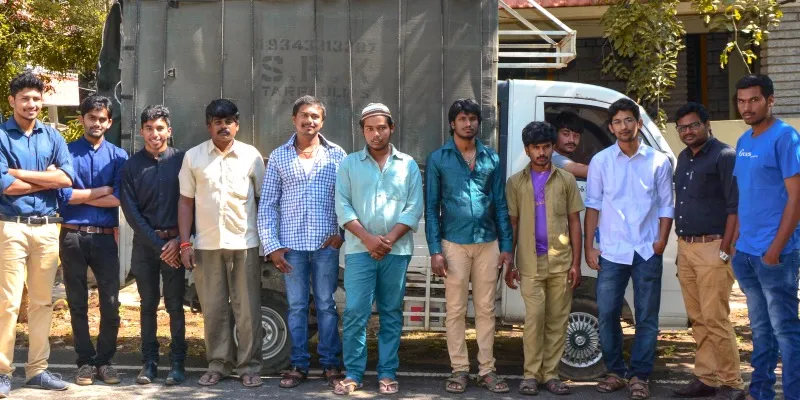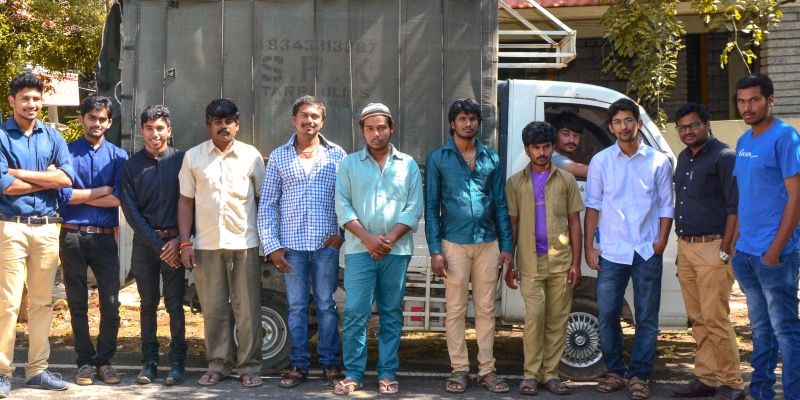Sendit aims to act as a bridge between logistic vendors and end users
‘Think of us as your next-door Gupta Uncle.’ These were the words that caught my attention for Sendit.in, an online logistics marketplace. While the logistics sector today has a plethora of startups, Sendit claims to be more focussed on solving the logistics problem than just increasing the fleet of vehicles.
Anyone who has taken a road trip knows it is not complete without seeing a fleet of trucks on the highway. It was the same sight of a fleet of trucks during a bike ride from Bengaluru to Davangere that gave Naveen Bagrecha and Puneeth B. the idea to look at a technology-based, on-demand trucking solutions system. After getting their friend Pankaj Sisodia in, the trio roped in Darpan Jain and Gourav.

Acting as a connector
“In the current scenario, the user has to interact individually with operators. This raises a lot of issues of trust, pricing and customer experience. On the other hand, operators don't have a common interface to receive orders. With transactions happening in isolation, there is not enough room for efficient optimisation of resources and time on the operator's end,” says Darpan. The team says there is no common platform where the end user can interact with the transport operators and Sendit intends to act as a bridge.
The team provides solutions for intra-city and inter-city goods movement. For this, they have a fleet of vehicles which works on a per-demand basis. To shift goods, all the user has to do is book a vehicle on the platform. Based on the needs, a vehicle in proximity to the user is assigned for the movement. The platform allows real-time tracking, status updates, pre-booking facility and trip logs.
“We take care of trust, pricing and reliability issues and ensure that the goods are delivered in a timely and safe manner. On the transport operator's end, we help them plan their transactions well, so that vehicles don't run empty due to lack of information about orders in a particular area,” says Darpan.
Current scenario
Sendit is operational in Bengaluru and Pune, and there are plans to launch in multiple cities by the end of this year. Customers can book orders via website, Android app or a telephonic call. All the operators have a mobile client installed on their phones for efficient tracking and management.
Starting with one vehicle and four to five daily transactions, Sendit today claims to have over 40 to 50 transactions with average ticket size of Rs 400. The team is bootstrapped but is looking for funding to increase its fleet capacity, market expansions and for improving technology.
Darpan says that if one has to look at the complete logistics market that includes transportation, warehousing, VALS and freight forwarding, transportation itself accounts for 61 per cent of the market. “This is because most industries end up spending more than half of their logistics budget on this function,” adds Darpan.
“Our target area would be the metropolitan clusters. Overall, it is projected to be a $175-billion dollar industry in 2019. It’s all about connecting the dots now to increase the efficiency of operators,” says Darpan.
The market
Logistics has always been looked at as a fragmented and unorganised function of any business. However, with the rise of e-commerce and on-demand delivery companies, businesses and consumers are demanding deliveries and supply chain to be more organised, agile and transparent.
According to some rough estimate, the market size of technology in logistics in India is roughly $2 billion and is much larger in other markets like South East Asia and the Middle East. Globally, companies like ORION software, OnFleet, Bringg, Infor, JDA Software and Elementum are established players.











